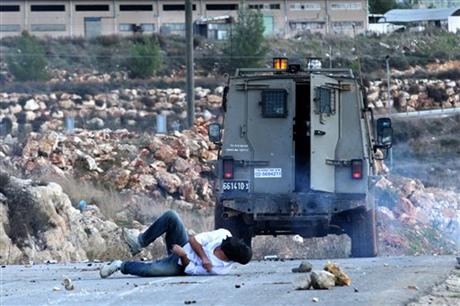
By IAN DEITCH
FILE – In this Friday, Dec. 9, 2011 file photo, Palestinian protester Mustafa Tamimi falls on the ground after being injured by a tear gas canister fired by Israeli troops during a demonstration in the West Bank village of Nabi Saleh, near Ramallah. The Israeli military said Thursday, Dec. 5, 2013, it has closed its investigation into the death of the Palestinian stone-thrower who was killed by a tear gas canister fired from close range by a soldier. (AP Photo/Haim Schwarczenberg, File)
Mustafa Tamimi
FILE – In this file photo taken Sunday, Dec. 11, 2011, a picture of Palestinian Mustafa Tamimi is seen on the wall of his family home during his funeral in the West Bank town of Nabi Saleh. The Israeli military said Thursday, Dec. 5, 2013, it has closed its investigation into the death of the Palestinian stone-thrower who was killed by a tear gas canister fired from close range by a soldier. (AP Photo/Bernat Armangue, File)
Prev 1 of 2 Next
JERUSALEM (AP) — Israel’s military prosecutor cleared a soldier who killed a Palestinian stone-thrower by firing a tear gas canister at close range from inside a jeep.
The soldier couldn’t see the Palestinian because the jeep’s back door was only slightly open and he did not violate rules of engagement, the military said late Thursday. Under those rules, soldiers are banned from aiming tear gas canisters directly at people.
The Israeli rights group B’Tselem said the army did not explain why firing the gas canister could be considered legal in circumstances in which the soldier couldn’t ensure he wouldn’t hit anyone.
B’Tselem spokeswoman Sarit Michaeli said that based on her group’s observations in the field, soldiers routinely fire tear gas canister at people. “It’s a common practice,” she said. “The army refuses to acknowledge that there is a problem, let alone works to resolve it.”
The protester, Mustafa Tamimi, 28, was killed during a clash between troops and Palestinian stone throwers in the West Bank village of Nabi Saleh in December 2011.
Tamimi was hurling rocks at an army jeep when a soldier inside opened the rear door and fired at him from just a few meters (yards) away, according to witnesses and a series of Associated Press photographs. Tamimi fell to the ground and was taken to an Israeli hospital where he died a day later.
Lt. Col. Peter Lerner, an army spokesman, said Tamimi’s death was an “individual tragedy, with an awful outcome.”
He said the soldiers operated “within their realm of responsibility,” and that Tamimi put himself at unnecessary risk by running toward the jeep.
Lerner said the case was complex and that a Palestinian who witnessed the incident refused to testify.
B’Tselem said the shooting was well documented and that the fact that it took two years to reach a decision “clearly demonstrates the failures of the military investigation system.”
Residents of several villages in the West Bank, including Nabi Saleh, have been holding weekly demonstrations to protest the construction of Jewish settlements and an Israeli separation barrier that eats up some Palestinian farmland along parts of its route.
Israel says it erected the barrier to keep out Palestinian suicide bombers following a wave of violence in the last decade.
Among those struck by tear gas canisters in such protests were Palestinian Bassem Abu Rahmeh, who was killed in 2009, and Tristan Anderson of Oakland, Calif., who suffers from brain damage, paralysis and seizures after being struck in the head in 2009.
Also Friday, Israeli police entered a sensitive holy site in Jerusalem’s Old City to disperse dozens of Palestinians who threw rocks at officers stationed nearby.
The scuffles occurred at a sacred compound revered by both Jews and Muslims. Jews call it the Temple Mount because of the biblical Jewish temples that once stood there. Muslims refer to it as the Haram al-Sharif, or Noble Sanctuary, marking the place where they believe Islam’s Prophet Muhammad ascended to heaven.
Police spokesman Micky Rosenfeld said Palestinians began throwing rocks at police after Friday prayers ended. He said police used stun grenades to disperse them and two arrests were made. There were no injuries, he said.
The fate of the eastern sector of Jerusalem, with its holy sites sacred to Jews, Christians and Muslims, is an emotional issue for all sides and lies at the heart of the conflict between Israel and the Palestinians.
The clashes erupted as U.S. Secretary of State John Kerry wrapped up his latest visit to the region aimed at keeping faltering peace talks between Israel and the Palestinians on track.



